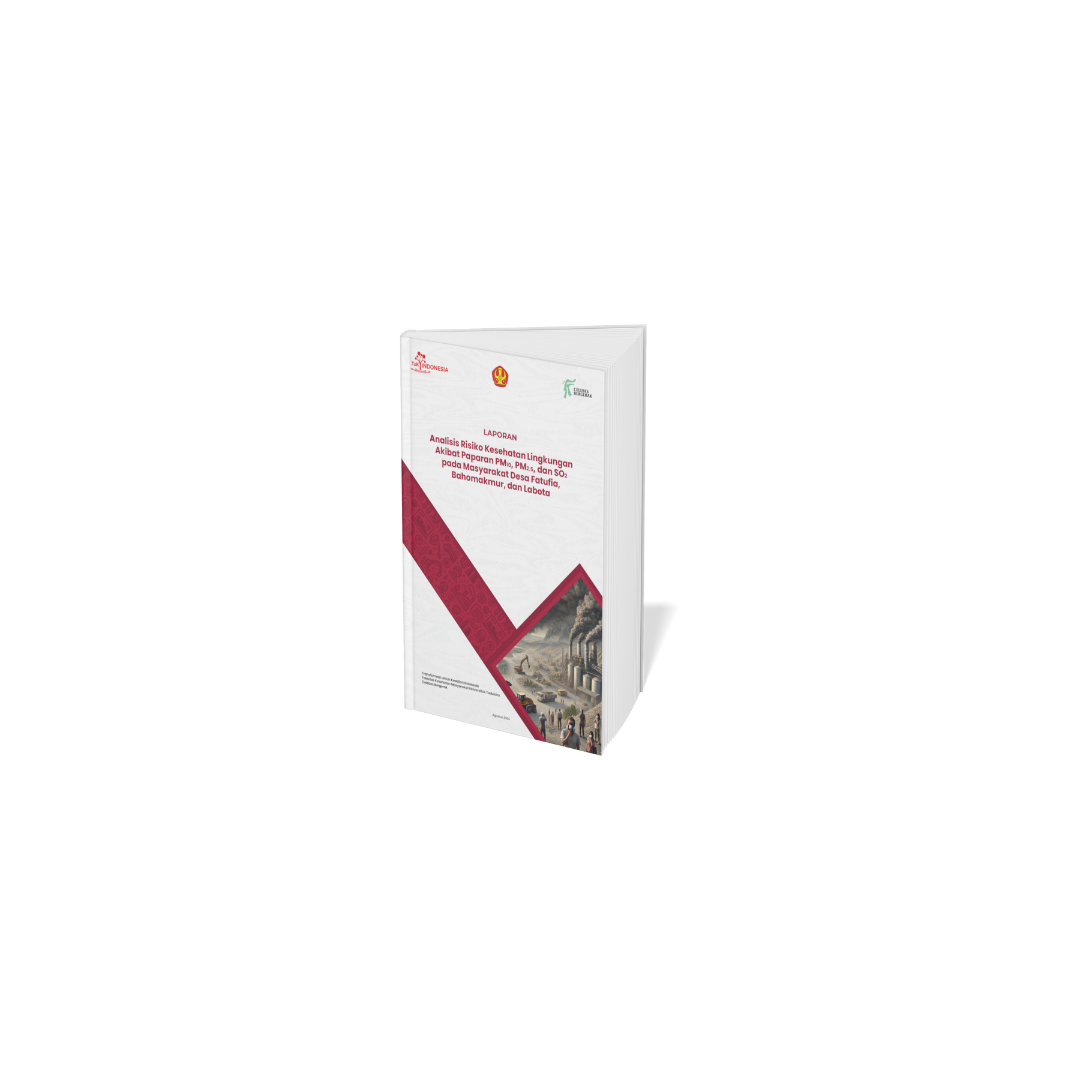29 August 2024 5 menit
Pollution in Bahodopi Sub District Found To Cause Health Risks for Civilians and Workers

Jakarta, 29th August 2024 – TuK INDONESIA, in collaboration with the Public Health Faculty of Tadulako University (FKM Untad), and the Celebes Bergerak organization, have released a joint research paper titled “Environmental Health Risk Analysis for Exposure to PM10, PM2.5, and SO2 in The Residents of Fatufia, Bahomakur, and Labota”. The research effort was conducted in the Sub District of Bahodopi, Morowali Regency, South Sulawesi, Indonesia, within industrial areas under management of PT. Indonesia Morowali Industrial Park (PT IMIP). The study has yielded data that indicates the presence of severe health risks in the population of residents and industrial workers exposed to air pollutants.
Since the founding of PT. IMIP in 2013, Morowali has developed into a new center of economic growth for Central Sulawesi and the nation in general. However its rapid economic development has come at the cost of greater health risks in its civilian population and for workers operating in industrial areas within and surrounding IMIP.
Abdul Haris, Head of Advocacy and Public Education for TuK INDONESIA, stated that the public has been burdened with a huge risk, especially working and non-working members of the population residing in close proximity to the IMIP industrial area. “Based on samples taken and studied by TuK INDONESIA and the People’s Action for Ecology and Emancipation (AEER) in 2023, average concentrations of particulates measured in the PT. IMIP, namely PM10, PM2.5, and SO2, have exceeded levels that are considered to be within safety standards. These conditions have a potential to cause long-term health effects,” he explained.
Abdul goes on to elaborate that the study uses a mixed method (quantitative and qualitative) to support evidence of basic rights violations, namely the basic health rights of residents in the Morowali Regency due to mining operations. “Industrial workers and residents living near the exposed areas have no other option but to face the dilemma of choosing between protecting their own health or sustaining their daily source of income,” he affirmed.
Based on the published report, there have been found an increase in Acute Respiratory Tract Infections (ISPA) over the last four years. In 2020, the number of ISPA patients reached 10,273 cases, increasing to 20,508 cases in 2021. Although the number of cases lowered to 13,081 in 2022, a significant rise occurred in 2023 up to a total of 55,527 cases. In addition, 372 cases of pneumonia were found in adults and 438 cases were found in toddlers.
Kiki Sanjaya, a lecturer from FKM Untad, explains the team of researchers involved in the study have developed and used a health risk calculation analysis using an Environmental Health Risk Analysis (ARKL) method. This approach involves deep analysis of variables to identify, assess, and predict situational and characteristic factors of the environment that may bear potential risks to human health. The team has also developed guidelines for managing causes of environmental disruption, civilian exposure, and effects on health. Estimates of health risks are made based on projections of previous datasets, and risk projections are categorized based on a time scale of 5, 10, and 30 years. If the civilian population is found to be at risk, risk management plans will need to be developed to anticipate long term health consequences.
“The ARKL method serves as a crucial foundation for the government’s efforts to create policy for monitoring and evaluating mining activities in Indonesia. Given that Bahodopi District is regularly opening huge employment opportunities and contributing to the region’s economic growth, this also calls for improvements in the health and environmental sectors,” said Kiki.
Pius Ginting, Coordinator of AEER, emphasized that the Ministry of Environment and Forestry (KLHK) should implement a direct environmental monitoring program focusing on air and river water quality in the IMIP area, including coastal waters, rather than relying solely on company-managed monitoring routines. He suggests that these results are to be regularly relayed to the public, including industrial workers on the site, making them aware of health risks that may arise due to pollution. Pius also noted that KLHK has yet to submit a detailed report regarding the environmental violations committed by companies in IMIP, given their PROPER rating denoted as “in the red”.
In response to these facts, TuK INDONESIA is urging the Indonesian government to take strict and immediate action to address these issues. The government must commit to its responsibility in ensuring the basic needs of every citizen, including economic, social, environmental, and health needs. Economic growth yielded by the nickel industry is without value if the public must bear the consequences of air pollution.
Furthermore, there must also be comprehensive evaluation and inspection of PT IMIP’s compliance with environmental pollution standards. If violations are found, consistent enforcement of the law is necessary. As a high-risk industrial center, Morowali Regency must be equipped with adequate healthcare services, skilled medical staff, sufficient medication supplies, and high-quality hospitals.
***
Note:
The standard of quality for PM2.5 set by the Environmental Protection Agency (EPA) in 2006 is 35 µg/m3 (daily average) and 15 µg/m3 (yearly average). The World Health Organization (WHO) has also set a standard quality for PM2.5 at 10 µg/m3 (yearly average) and 25 µg/m3 (daily average) (WHO, 2005). Meanwhile, the standard quality for PM2.5 in ambient air established in the Government Bill (Peraturan Pemerintah RI Nomor 22 Tahun 2021) is 55 µg/m3 (daily average) and 15 µg/m3 (yearly average).
For further questions and details regarding this press release, please contact:
Abdul Haris : [email protected]
Icanna : [email protected]
Download Book
This post is also available in: Indonesian
